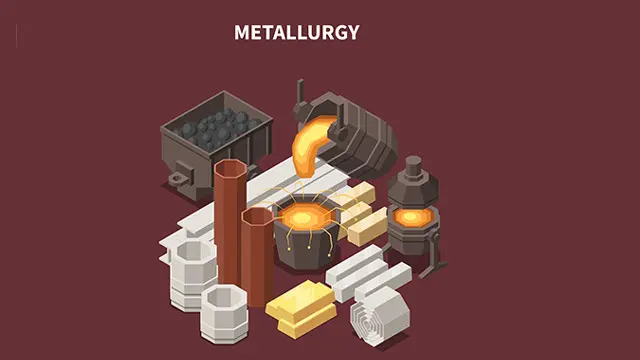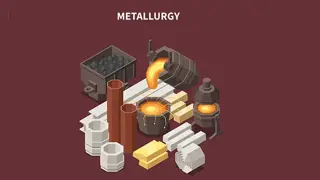
Metallurgy Training Course
Updated study materials |* Free Certificate *|* Designed by Industry Experts *| Instant Access | 24/7 Support
Course Line On Demand
Summary
- Reed Courses Certificate of Completion - Free
- Tutor is available to students
Add to basket or enquire
Overview
Welcome to Metallurgy Training, a comprehensive and engaging course designed to provide you with in-depth knowledge and practical skills in Metallurgy. Throughout this course, we will explore various aspects of Metallurgy and delve into its fundamental concepts, advanced techniques, and real-world applications.
Our primary objective in Metallurgy Training is to equip you with a solid foundation in Metallurgy. Whether you are a beginner or an experienced professional looking to expand your expertise, this course will cater to your needs and help you achieve your learning goals.
During our journey together, you will have the opportunity to:
- Gain a thorough understanding of the core principles and theories that underpin Metallurgy.
- Acquire practical skills through hands-on exercises, projects, and real-world examples.
- Explore cutting-edge advancements and emerging trends in the field of Metallurgy.
- Prepare for future opportunities, such as further education, career advancement, or entrepreneurship, in the field of Metallurgy.
- Reflect on your learning journey, celebrate your achievements, and gain the confidence to excel in Metallurgy.
By the end of Metallurgy Training, you will have gained a comprehensive understanding of Metallurgy and developed the skills necessary to succeed in this dynamic field. Whether you choose to pursue further education, enter the job market, or embark on entrepreneurial ventures, this course will lay a strong foundation for your future endeavours.
We are excited to have you join us on this educational journey, and we look forward to helping you unlock your full potential in Metallurgy Training. Let's get started!
Why should you choose Course Line?
When it comes to quality education and professional development, Course Line stands out as one of the most prestigious learning providers. As a certified institution by UKRLP & CPD Group, we have a proven track record of excellence, having successfully taught over 20,000+ students and counting.
Curriculum
-
Lecture 1: History of Metalwork and Metallurgy 06:00
-
Lecture 2: Ore and Metallurgical Processing Metallurgy 07:00
-
Lecture 3: Metal Properties and Alloys 03:00
-
Lecture 4: Mechanical Properties of Metals 02:00
-
Lecture 5: Strength in Metals 06:00
-
Lecture 6: Corrosion Resistance 03:00
-
Lecture 7: Types of Iron (Ferrous Metals) 03:00
-
Lecture 8: Types of Steel (Another Ferrous Metal) 08:00
-
Lecture 9: Nonferrous Metals and Alloys 06:00
-
Lecture 10: Metalworking Processes 06:00
-
Lecture 11: Metal Identification and Testing Methods 07:00
-
Final Exam 11:00
Course media
Description
Welcome to the course outline for Metallurgy Training. In this comprehensive learning journey, we will explore the depths of Metallurgy, delving into its core principles, practical examples, and advanced techniques. Through a series of engaging lectures and exercises, you will gain the knowledge and skills necessary to excel in the field of Metallurgy Training.
*****Metallurgy Training Course Syllabus*****
Lecture 1: History of Metalwork and Metallurgy
- Metals and temperature
- Metals found in ancient history
- The Copper Age (from 8700 BC)
- The Bronze Age (from 4500 BC)
- The Iron Age (from 1500 BC)
- The Discovery of Steel (circa 1100 BC)
- The Emergence of Cast Iron
Lecture 2: Ore and Metallurgical Processing Metallurgy
- What is Metallurgy?
- Metal technology
- Chemical metallurgy
- Physical metallurgy
- Extractive metallurgy
- Mineral processing
- Mineral processing (continued)
- Hydrometallurgy
- Pretreatment
- Pyrometallurgy
- Heat sources used in Pyrometallurgy
- Electrometallurgy
- Overlapping of electrometallurgy with other processes
- Processing of Ores
- Metal ore
- Oxidation potential of ore
Lecture 3: Metal Properties and Alloys
- Metal properties
- Ferrous (or black) vs non-ferrous (colored) metallurgy
- Ferrous and nonferrous metal classes
- Pure metals and alloying elements
- Alloy metals
- Iron alloys
- Conductive alloys
- High strength to weight ratio
- Chemical symbols of metals
- Determining of a metal’s properties
Lecture 4: Mechanical Properties of Metals
- Types of mechanical properties
- Compressive stress
- Tensile stress
- Shearing stresses
- Strength variations between force types
- Fatigue
Lecture 5: Strength in Metals
- Compressive strength
- Shear strength
- Hardness
- Hardness testing
- Rockwell test
- Rockwell testers
- Rockwell readings
- Toughness
- Elasticity
- Elasticity of metal
- Plasticity
- Brittleness
- Ductility and malleability
- Exhibiting of more than one property
Lecture 6: Corrosion Resistance
- Corrosion resistance
- Corrosion and oxidation
- Corrosion in ferrous or non-ferrous metals
- Corrosion resistance
- Galvanized steel
- Presence of impurities
- Alloying for better corrosion resistance
Lecture 7: Types of Iron (Ferrous Metals)
- Ferrous metals
- Pure iron
Lecture 8: Types of Steel (Another Ferrous Metal)
- Steel
- Classifying steel
Lecture 9: Nonferrous Metals and Alloys
- Nonferrous metals
- Copper
- Heat treating of copper
- Brass
- Grades of brass
- Bronze
- Nickel
- Lead
- Zinc
- Tin
- Aluminum
- Duralumin (2017-T4)
- Alclad
- Monel
- K-monel
- Inconel
Lecture 10: Metalworking Processes
- Metalworking
- Cutting and shaping metal
- Machining
- Bulk forming
- Metal joining
- Cold-working
- Work hardening
- Casting
- Forging
- Rolling
- Cladding
- Drawing and extrusion
- Sintering
Lecture 11: Metal Identification and Testing Methods
- Metal identification
- Surface appearance
- Classifying metals based on appearance
- Other ID methods
- The Spark tests
- The test area
- The test samples
- Grinding wheel
- Compressed air method
- Automated spark testing
- Conducting the Spark Test
- Spark stream for low carbon steels
- Spark stream for white cast iron
- Spark stream for gray cast iron
- Spark stream for malleable iron
- Spark test for wrought iron
- Spark test for stainless steel
- Magnetic test
Assessment Process
Upon completing the Metallurgy Training course, you will be required to undertake a multiple-choice evaluation in order to gauge your understanding of the material covered.
If you do not achieve the minimum passing score, you will have the opportunity to retake the assessment without incurring any additional cost.
Certification
After successfully completing this Metallurgy Training course, you will get an instant Free digital certificate.
Who is this course for?
Metallurgy Training is designed to cater to a wide range of individuals who are eager to enhance their knowledge and skills in Metallurgy.
This course is suitable for:
- Beginners in Metallurgy
- Professionals
- Students
- Career changers
No matter your background or level of experience, Metallurgy Training offers a comprehensive learning experience that caters to your specific needs. Join us on this educational journey and unlock your potential in Metallurgy today!
Requirements
Requirements for the Metallurgy Training course:
- No Prior Knowledge Required
- Basic Computer Skills.
- Internet access.
- Familiarity with English
Career path
Completing Metallurgy Training course can open exciting career opportunities in various fields related to Metallurgy. Here are three potential career paths you can pursue after completing Metallurgy Training:
- Materials Engineer
- Process Metallurgist
- Extractive Metallurgist
- Physical Metallurgist
- Welding Engineer
- Quality Control/Quality Assurance Specialist
- Metallurgical Consultant
Questions and answers
How long do I have to complete the course is it a case of being able to do modules at my own pace around my life or in a time limit
Answer:Hi Ethan, This is a self-paced course with lifetime access that means you can do it with your convenient time. Regards Course Line
This was helpful.
Certificates
Reed Courses Certificate of Completion
Digital certificate - Included
Will be downloadable when all lectures have been completed.
Reviews
Currently there are no reviews for this course. Be the first to leave a review.
Legal information
This course is advertised on reed.co.uk by the Course Provider, whose terms and conditions apply. Purchases are made directly from the Course Provider, and as such, content and materials are supplied by the Course Provider directly. Reed is acting as agent and not reseller in relation to this course. Reed's only responsibility is to facilitate your payment for the course. It is your responsibility to review and agree to the Course Provider's terms and conditions and satisfy yourself as to the suitability of the course you intend to purchase. Reed will not have any responsibility for the content of the course and/or associated materials.


